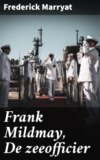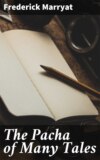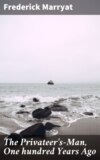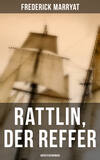Kitabı oku: «The King's Own», sayfa 24
Chapter Forty Three.
The unwieldy elephant,
To make them mirth, used all his might, and wreathed
His lithe proboscis.
Milton.
Captain M — remained but a few days at Calcutta, where he perceived little difference between the society and that of England, remarking only that the gentlemen were more hospitable, and the ladies drank more beer. But I am trespassing, notwithstanding my promise to the contrary, at the end of the last chapter. I will therefore be off at once, before I am decidedly guilty of a breach of faith. The Aspasia’s orders were to join the admiral, who had quitted the Bay of Bengal, and proceeded to Bombay, to avoid the monsoon, which was about to set in; and as there was no time to be lost, Captain M — did not touch at Madras, but made all possible haste to gain the tranquil side of the peninsula. The governor-general had requested that he would call at Travancore, to deliver a letter and complimentary present to the reigning queen, who held her possessions tributary to our government.
The Aspasia anchored off the town, and was shortly afterwards boarded by one of the ministers of the queen, a venerable Mussulman, who brought a boat-load of compliments and vegetables. He was accompanied by one or two others, among whom was a very indifferent interpreter. Captain M — , who was anxious to join the admiral, excused himself on the plea of ill health, from delivering the present and letter in person, and expressed his wish to the deputy that he would take them in charge, stating, that his services were required elsewhere; he requested that an answer to the letter might be sent on board as soon as possible. This was explained through the interpreter, and Captain M — then inquired what time would probably elapse before the answer would be sent. The reply was, in a week, or ten days.
“Ask him,” said Captain M — , “whether it cannot be sent to-morrow morning, as I am anxious to proceed?”
After an exchange of several sentences between the interpreter and the deputy, who observed the most imperturbable gravity, the former replied to Captain M — .
“He say no, sar. Little people, like you and me, write letter very quick, all in one minute. Great people, like king and queen, not possible write letter less than week or ten day. Not fashion this country, sar.”
The presents being placed in the boat, and the letter presented on a silver salver, the deputy made a low salaam, and departed. Captain M — , aware that all attempts to hasten them would be useless, made no further remarks on the subject. The next morning the same grave personage came on board, attended by the interpreter and his suite, with many compliments from their royal mistress, who had sent a present for the captain. During the time of the delivery and interpretation of the message, the natives, who rowed in his boat, handed up a large black monkey, with a long white beard extending over his chin and shoulders. The animal, who did not seem well pleased with his change of situation, and who was naturally of a vicious temperament, flew round and round the length of his tether, catching at the trousers of the sailors with his paws and teeth, and using the latter without the least ceremony.
“Queen say, sar — Many compliments, and tell you it very high caste monkey — very high caste, indeed, sar, — very fine present, sar.”
“It may be,” observed Captain M — to the first-lieutenant; “but I wish she had saved herself the trouble. I must not refuse it; and what can we do with the brute?”
“It will amuse the men, sir; he seems to have plenty of devil in him.”
“Oh!” roared Prose, “I do declare he has bit a piece out of my leg. High caste, indeed. I should like to give him a high cast overboard.”
“Really, Prose, that’s not so bad,” observed Seymour. “Jerry was correct in his assertion that you had plenty of wit, only it required strong measures to extract it from you.”
“Queen say, sar, write letter in five or six days, and say, suppose Captain Saib and officers come on shore, order everybody go hunt tiger: Queen tell people make everything proper. Very fine tiger hunt, sar.”
Captain M — , who was convinced that he must patiently await their own time, did not expostulate at the delay. Not wishing to avail himself of the offer, he requested the officers would consider themselves at liberty to accept the invitation, which was intended as a compliment, and therefore ought not to be refused.
A large party was formed, who, on the ensuing day, accompanied by the deputy and his suite, and provided with fowling-pieces and muskets, landed at the town, where they were received by a few tom-toms, and some hundreds of spectators. On their arrival at a house which had been prepared for their reception, they found a splendid breakfast awaiting them, to which they did as ample justice as a celebrated traveller to that which welcomed him at New York, although they did not, like him, revel to satiety, by plunging into oceans of tea and coffee.
Again the talents of the interpreter were called into action, to explain the reason why her Majesty could not receive them, which he did by laying his hand across what medical men would term the abdominal region (or, as Mrs Ramsbottom would have said, “her abominable region”) and informing them that the queen was not well there. The party required no further explanation. They expressed their regrets, finished their breakfast, and then stated themselves ready to proceed.
“Game not come yet, sar — game not come till to-morrow.”
“Well, then, we must go to it,” replied Courtenay.
“Ah, gentleman not understand shoot in this country,” continued the interpreter, who then, with some difficulty, contrived to make them understand that about four thousand men had been summoned to drive the game close to the town, and that, to ensure a sufficiency of sport, the sweep which they had taken was so great, that they would not close in till the next morning. He added, that as, perhaps, they would like to see the jungle to which the game was to be driven, horses and elephants had been prepared, and refreshments would be provided at any spot where they might wish to alight.
Macallan, who had provided himself with his hammers, and other implements requisite in the pursuit of his favourite sciences, mineralogy and geology, was not sorry for the delay, and the remainder of the party were satisfied with the idea of a pleasant excursion. Previous to their setting off; a variety of performers were ordered in to amuse them with feats of juggling and address, which would have been acknowledged, if seen in England, to have far surpassed those of the celebrated Ramoo Samee and his associates. Amongst the rest, the majestic attitudes of the dancing snakes particularly attracted the attention of Macallan, who expressed to the interpreter his wish to procure one of the species (the famed cobra di capella), with the fangs not extracted. The interpreter, after a few words with the deputy, informed the doctor, with his usual politeness, “that all the snakes in the country were at the service of the gentleman; but take care not let bite, because very high caste snake.”
“What do they mean by calling the animals of the country high caste?” inquired Seymour of Macallan. “I thought it was a term only applied to the Brachmins and Rajahpoots.”
“Both the monkey and the snake are indirectly worshipped by these people,” replied the doctor, “as their supposed deities are represented to have assumed these forms. The more vicious, or the more venomous, the higher they rank. The cobra di capella is, I believe, the most venomous serpent that exists.”
“I do declare that that monkey deserves his rank,” observed Prose. “I can hardly walk, as it is.”
“Well, but you can ride, Prose, and here are the horses.”
The horses, with three elephants, two with howdahs on their backs, and the other loaded with a large tent, were now paraded before the door; each horse was attended by his syce, or groom, who never quitted him, but fanned away the flies with a chowry, or whisk, formed of a horse’s tail. They were beautiful animals, but much too spirited for some of the party, who felt alarm at the very anticipation of the difficulty they would have in retaining their seats.
Prose, who had never been twice in his life on the back of any animal, was in sad trepidation; he looked first at the horses, who were plunging and rearing in the hands of the syces, who could with difficulty restrain their impatience, and then at the elephants, whose stupendous size, flourishing probosces, projecting tusks, and small, keen eyes, equally filled him with dismay.
“I do declare,” observed Prose, affecting an extra limp, “my leg is very bad. I think.”
“Come, come, Mr Prose, no hauling off; no leg-bail, if you please,” said Courtenay, who, with Seymour, was already mounted, upon a spirited Arabian; “take your choice — but go you must.”
“Well, then, if I must, which would you advise me to take?”
“Take a horse,” said Seymour, laughing; “of two evils always choose the least.”
“Take an elephant, Mr Prose,” cried Courtenay; “his size is double, but he’ll give you less trouble.”
“Why, that’s a rhyme, I do declare; but how shall I get upon his back?”
“Oh! he’ll take you up in his trunk, and put you on.”
“Indeed he shall not,” cried Prose, retreating some paces; “I say, Mr Interpreter, how am I to get on the top of that great beast?”
“As you please, sar. Suppose you like get up before, he lift up his leg for you to climb up. Suppose you like to get up behind, he not say nothing. Suppose you wish go up his middle, you ab ladder.”
“Well, then, Mr Interpreter, I shall feel very much obliged to you for a ladder.”
A ladder was brought. Prose, and Macallan, with his implements, ascended to the howdah, fixed on the back of the enormous brute. The remainder of the party being ready, they set off; accompanied by the deputy, the interpreter, and several other handsomely attired natives, who, out of compliment to the officers, had been ordered to attend them. The country, like most parts of India near to the coast, consisted of paddy or rice fields, under water, diversified with intersecting patches of jungle and high trees. Occasionally they passed a deeper pool, where the buffaloes, with only their horns and tips of their noses to be seen, lay, with the whole of their enormous carcasses hid under the muddy water, to defend themselves from the attacks of the mosquitoes, and the powerful rays of the sun.
“Look at the buffaloes, Prose.”
“Where, Seymour? I can’t see any. I never saw a buffalo in my life. It’s like an ox, an’t it?”
“It’s very like a whale,” replied Courtenay.
At this moment one of the herd, startled at the near approach of the cavalcade, rose from the stagnant pool, where he had been lying, and presented his immense carcass, covered with mud, to Prose’s wondering eyes.
“Lord, Molly, what a fish!” exclaimed Courtenay, with affected surprise, alluding to an old standing naval joke.
“Now, is that a fish?” cried Prose, a little alarmed. “Well, I do declare! I say, Mr Interpreter, what is that thing?”
“Call him buffalo, sar.”
“Well, I do declare! I always thought that buffaloes were animals that lived on shore.”
“Nothing like travelling, Mr Prose,” observed Courtenay; “you’ll know a buffalo, now, if ever you happen to hook one, when you are fishing out of the fore-chains.”
“And you’ll remember a high-caste monkey, if ever you meet with one again,” added Seymour.
“That I shall, all the days of my life.”
The country, as they proceeded inland, materially altered its features. Forests of large trees and fragments of rocks met their view, instead of the paddy-fields, which they had left behind; and Macallan now wished to descend, that he might collect geological specimens. Explaining his reasons, he desired the interpreter to order the elephant to stop.
“Suppose gentleman want stones, elephant give them,” replied the interpreter; “no occasion for Saib to get off;” and explaining the doctor’s wishes to the conductor of the elephant, the knowledge of which occasioned a laugh among the natives, who could not conceive why the doctor should want the stones, he continued, “Now, sar, you point any stone you want.”
The doctor did so; and the conductor, speaking to the elephant, the proboscis of the sagacious animal immediately handed up the one pointed out, to his conductor, who passed it to Macallan.
For more than an hour the doctor amused himself with breaking and examining the different specimens presented to him, until he passed by an isolated mass, whose component parts, glittering in the sun, made him anxious to obtain a specimen. It was a large rock, about the size of six elephants, and the doctor pointed to it.
“Ah, sar!” interrupted the interpreter; “elephant very strong beast, but no lift that.”
“I did not imagine that he would, but I must dismount to examine it,” replied Macallan, gravely, who was absorbed in his scientific pursuits.
The elephant stopped; and the doctor, not aware of the great height, attempted to slip down his side; he succeeded in reaching the ground, not exactly on his feet, to the great amusement of the party. Regardless of trifles, when in pursuit of science, he desired Prose to throw him down his bag of implements, and proceeded to the object of his investigation, which appeared to him so peculiar, that he requested the others to continue their excursion, and leave him to be picked up on their return.
“Ah, massa! like stop this place?” said the interpreter.
“Yes,” replied the doctor.
“Do you really intend to remain here?” inquired Courtenay.
“I do: it is a very remarkable specimen of cinnamon-stone, and I must procure some of it if possible.”
“Well, I do declare!” said Prose: “I thought cinnamon grew upon trees. Doctor, I should like to stay with you, for this beast does shake me so, I’m quite sore — and I’ve such a stitch in my side.”
Prose accordingly prepared to descend, and was recommended by the interpreter to slide down by the hind leg of the animal.
“He won’t kick, will he?”
“Elephant no kick, sar,” and Prose descended in safety, while the remainder of the party continued their excursion.
The doctor walked several times round the rock, to find a point upon which he would be able to make some impression with his implements; but the fragment, which had probably remained there since the deluge, without having been honoured by a visit from a naturalist, was worn quite smooth by time, and presented no acute angle, within reach, upon which his hammer could make any impression; nor could he climb it for it rose from its base in almost a perpendicular line. The more he scrutinised, the more anxious was he to obtain specimens, and he determined to blast the rock. Being prepared with a couple of short crowbars, and a flask of gunpowder, he fixed upon a corner, which appeared more assailable than the rest, and commenced his laborious occupation.
“Can I assist you, Mr Macallan?” inquired Prose.
“You can, indeed, Mr Prose. Now, observe; continue driving the end of the crowbar straight into this hole until you have made it about nine or ten inches deep; that will be sufficient. I will make another on the other side.”
Prose commenced his labour, and, for a few minutes, worked with due emphasis; but he soon found out that he had volunteered to a most fatiguing task. He stopped, at last, for want of breath.
“Well, Mr Prose,” inquired the doctor, from the other side of the rock, observing that he had ceased from his labour, “how do you get on?”
“I wish to Heaven I had never got off;” muttered Prose, “for this is worse than the elephant.”
But the doctor was an enthusiast, a description of person who never tires, and he judged of others by himself.
“How far have you got now, Mr Prose?”
“Oh — I think I have got an inch and a half good,” answered Prose, quite exhausted.
“No more!” exclaimed Macallan; “why, you must work harder, or we never shall blast it.”
“I have been blasting it in my heart,” thought Prose, “for these last ten minutes,” and he resumed his labour.
“You know nothing of mineralogy?” inquired the doctor, after a silence of a few minutes.
“This is my first lesson, doctor,” answered Prose, out loud; and muttering in continuation, “I do declare it shall be the last.”
“It’s a very amusing study,” continued Macallan; “but, like most others, rather dry at first.”
“Anything but dry,” thought Prose, wiping his face with his handkerchief.
“I shall be happy to give you any information in my power,” said Macallan; “but you must be attentive — nothing is to be obtained without labour.”
“I’m sure mineralogy is not,” retorted Prose, throwing down his crowbar from exhaustion.
Fortunately for Prose, by the directions of the interpreter, the baggage elephant who carried the tent, and the natives accompanying it, now halted opposite to the rock, on the side where Prose was, for the wish expressed by Macallan to remain there had been construed by the interpreter as a selection of the place where the refreshments should be prepared. One of the natives, perceiving what Prose was about when he threw away the crowbar, offered his assistance, which was readily accepted, and the labour was continued.
“Well, Mr Prose, how do you get on now?”
“Oh — capitally.”
“Don’t you find it very warm?” continued Macallan, who stopped to wipe the streams of perspiration from his own face.
“Oh, no,” answered Prose, chuckling.
“Well, I do, I can assure you,” answered the doctor, who, not wishing to show symptoms of flagging while Prose was working so hard, recommenced his labour.
Another quarter of an hour, and the doctor was quite exhausted; wishing for an excuse to leave off himself, he called again to Prose —
“An’t you tired, Mr Prose?”
“Not the least, doctor.”
“Oh, but you must be — you had better rest yourself a little.”
“Thank you, but I’m not the least tired.”
Another five minutes. — “Well, Mr Prose, I really give you great credit for your perseverance. Let me see how deep you are,” said Macallan, who could find no other excuse for being the first to abandon his task.
But Prose, who was not exactly a fool, determined not to lose his credit with the doctor — pushing aside the native, he took the crowbar from him, and before the doctor had walked round, was again hard at work.
“Upon my honour I give you great credit,” observed the panting Macallan, as he witnessed the effects of the labour.
“But,” observed Prose, “why should we work this way when there are a parcel of black fellows doing nothing? here, I say, you chap, come and punch here,” continued he, pointing the crowbar to the native, who immediately resumed his labour. “You call another, Mr Macallan, and make him work for you.”
“Well thought of; Mr Prose,” answered the doctor, and another native being put in requisition, in less than an hour the rock was perforated to the depth required, without the least appearance of fatigue, or even heat upon the skins of the temperate Hindoos. In the meantime the tent was erected, the mats and carpets spread, the fires lighted, and the repast preparing by the cooks who were in attendance. The doctor, who was absorbed in his views, heeded it not, and had just finished the charging and priming of the rock when the cavalcade returned from their excursion.
“Well, doctor, how do you get on?” inquired Courtenay.
“Oh, I’m all ready, and you had better remove to a little distance, as I’m about to fire my trains.”
“Fire your trains! — Why, what have you been about?”
“I am going to blast the rock.”
“The devil you are — then I’m off;” cried Courtenay, who, with Seymour, retreated from the well-known effects of gunpowder.
The natives who accompanied them also retired, although not aware of the nature of the operation. The interpreter understood “gentlemen make fireworks,” and reported accordingly.
The doctor lighted his matches and withdrew, followed by Prose, who forgot his limp upon this occasion. The mines exploded, splitting large fragments from the rock, and shaking it from its base.
“Capital!” exclaimed the doctor who, as soon as the smoke had cleared away, ran up, and was in ecstasies at the variety and brilliancy of the specimens which were now exposed to his eager view.
But in his enthusiasm the doctor quite overlooked the mischief which he had occasioned. One large fragment had struck the tent to the ground; others had scattered the cooking utensils, with their contents, and wounded the unfortunate cooks; while the affrighted elephant had completed the demolition by trotting over the whole, his trunk raised high in the air, uttering shrill cries, and regardless of the admonitions of his conductor. All was confusion and dismay.
The natives when they witnessed the damage were astonished. A long consultation took place between them, as to what the doctor meant; at last it was decided by the grave deputy that it was intended as a compliment to them — for all fireworks were compliments in that country. They therefore salaamed with great good humour: but the English knew better, and commenced a violent attack on Macallan, who was still absorbed in collecting specimens, and quite unconscious of the mischief which he had created.
“You’ve not only destroyed our dinner,” continued Courtenay, “but you’ve killed three cooks, and wounded seven more.”
“Is it possible!” cried Macallan, with dismay, throwing away his specimens with as much haste as he had seized upon them, and running in the direction of the men reported to be hurt. Fortunately for his peace of mind, Courtenay’s list of killed was all invention, and the wounded were reduced to two, which the doctor conscientiously reported under the head of slightly.
There was no help but to proceed to town, and wait until another repast could be provided. This was soon done, and the interpreter, with a double salaam, informed the doctor, that “if gentleman wish, blow up another tent, deputy have one ready for him next day.”
“Well, now, I do declare these people are very polite,” observed Prose; “but I hope that if you do, doctor, you will not make me a party to it. I would never have punched so hard at that hole if I thought that it was to have blown up my own dinner.”
“You’re right, Mr Prose,” answered Courtenay. “The doctor did not treat us according to the Scriptures. We asked for bread, and he gave us a stone — rather annoying too, after a long ride. But, however, as the game is to come to us tomorrow, we had better be up early to receive it in due form — so good night.”










